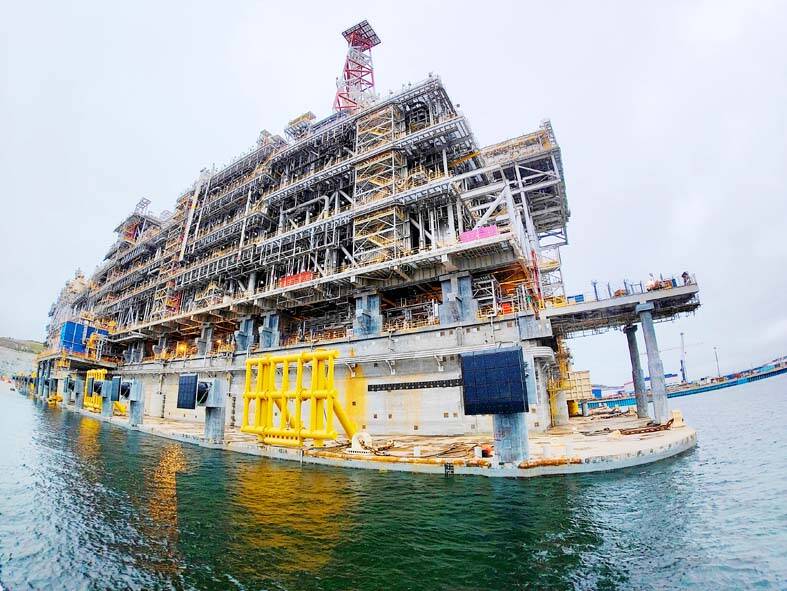Taiwan’s petrochemical industry imported record amounts of Russian naphtha last month, snapping up fresh supplies being churned out by an oil refinery thousands of miles away.
The nation imported almost 114,000 barrels a day of Russian naphtha last month, representing 66 percent of its total imports of the feedstock for the month, data from energy analytics firm Kpler showed. The hike — to an all-time high — consolidates Russia’s ranking as Taiwan’s top supplier, a position previously held by the United Arab Emirates.
The surge is mainly driven by a recent startup of a third condensate splitter at Novatek PJSC’s Ust-Luga refinery, Kpler lead crude analyst Viktor Katona said.

Photo: Reuters
So far this year, Taiwan was the destination for as much as 78 percent of all Novatek’s monthly naphtha exports from the Baltic Sea port, Kpler’s figures showed.
Russian fuel producers have been expanding in Asia and Latin America after western countries and their allies, earlier the main consumers of Russia’s oil products, banned the imports following the invasion of Ukraine.
Novatek’s Ust-Luga refinery processes condensate, a very light type of oil. It brought a third splitter online in mid-August, allowing for increased naphtha flows, Katona said.
As a result, in the second half of August and early September, the plant raised its processing runs to a historic high of more than 195,000 barrels a day, compared to around 140,000 barrels a day in previous months, industry data seen by Bloomberg showed.
That ramp up move coincided with a jump in Russian naphtha exports to Taiwan. It takes roughly 60 days for the Ust-Luga cargoes to reach the Asian country.
Shortly after the third splitter came online, Novatek started maintenance at at least one of the original units, which temporarily cut the plant’s runs, the industry data seen by Bloomberg showed
“Novatek’s Ust-Luga facility has yet to see a month when all three splitters are running at full capacity,” Katona said. “Once that happens in December or January, Russian flows to Taiwan could easily stay above 100 thousand barrels per day on a sustainable basis.”
Novatek did not respond to a request for a comment on the maintenance schedule and production levels at its Ust-Luga refinery.

Taiwan’s rapidly aging population is fueling a sharp increase in homes occupied solely by elderly people, a trend that is reshaping the nation’s housing market and social fabric, real-estate brokers said yesterday. About 850,000 residences were occupied by elderly people in the first quarter, including 655,000 that housed only one resident, the Ministry of the Interior said. The figures have nearly doubled from a decade earlier, Great Home Realty Co (大家房屋) said, as people aged 65 and older now make up 20.8 percent of the population. “The so-called silver tsunami represents more than just a demographic shift — it could fundamentally redefine the

The US government on Wednesday sanctioned more than two dozen companies in China, Turkey and the United Arab Emirates, including offshoots of a US chip firm, accusing the businesses of providing illicit support to Iran’s military or proxies. The US Department of Commerce included two subsidiaries of US-based chip distributor Arrow Electronics Inc (艾睿電子) on its so-called entity list published on the federal register for facilitating purchases by Iran’s proxies of US tech. Arrow spokesman John Hourigan said that the subsidiaries have been operating in full compliance with US export control regulations and his company is discussing with the US Bureau of

Businesses across the global semiconductor supply chain are bracing themselves for disruptions from an escalating trade war, after China imposed curbs on rare earth mineral exports and the US responded with additional tariffs and restrictions on software sales to the Asian nation. China’s restrictions, the most targeted move yet to limit supplies of rare earth materials, represent the first major attempt by Beijing to exercise long-arm jurisdiction over foreign companies to target the semiconductor industry, threatening to stall the chips powering the artificial intelligence (AI) boom. They prompted US President Donald Trump on Friday to announce that he would impose an additional

Pegatron Corp (和碩), a key assembler of Apple Inc’s iPhones, on Thursday reported a 12.3 percent year-on-year decline in revenue for last quarter to NT$257.86 billion (US$8.44 billion), but it expects revenue to improve in the second half on traditional holiday demand. The fourth quarter is usually the peak season for its communications products, a company official said on condition of anonymity. As Apple released its new iPhone 17 series early last month, sales in the communications segment rose sequentially last month, the official said. Shipments to Apple have been stable and in line with earlier expectations, they said. Pegatron shipped 2.4 million notebook